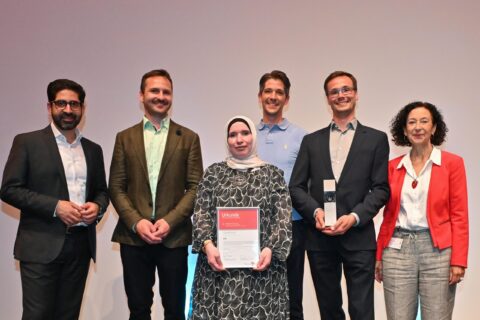FAU startup wins 10,000 euros in Science4Life competition
“CiX” develops new technology for sustainable water purification
The team from CiX won second place in Germany’s largest national business plan competition. CiX is a start-up supported by Friedrich-Alexander-Universität Erlangen-Nürnberg (FAU) that has invented an innovative water purification technique.
During the business plan phases of the Science4Life Venture Cup 2025, Rudolf Borchardt, Dr. Timo Fromm, Benjamin Seemann and Dr. Hanadi Ghanem (all from the Chair of Materials Science and Engineering for Metals ) came in second and were awarded 10,000 euros prize money. CiX produces ready-to-connect purification systems to remove hazardous substances from water.
Hazardous substances constantly find their way into our water systems. Current methods for ridding water of these residues that are harmful to health and the environment are costly, outdated and not sustainable. This is the starting point for CiX’s vision: “Water. Free from hazardous substances.” Specially developed systems with innovative diamond electrodes break down hazardous substances without having to burn or vaporize them.
Purifying water directly in situ in this way creates a resource-efficient cycle that considerably reduces water consumption. The system can use electricity to remove substances such as medicinal residues, bacteria and the “forever chemicals” PFAS (per- and polyfluoroalkyl substances) from water efficiently as and when needed.
About the Science4Life competition
Once a year, the independent entrepreneurship initiative “Science4Life e.V.”, organizes Germany’s largest business plan competition for the life sciences, chemistry and energy sectors. During the competition, teams can choose from a selection of training and coaching sessions. The winning teams qualify for further selected workshops. Since the first call for applications in 1998, nearly 10,000 people have taken part in the competition and more than 1,500 companies have become established as a result.
In 2025, a record number of 94 submissions were entered to Science4Life. At the end of the day, eight teams from across the whole of Germany were able to convince the jury with their visionary solutions for medical therapies, analyses, environmental technology and energy supply.
More information:
Benjamin Seemann
Chair of Materials Science and Engineering for Metals
benjamin1.seemann@fau.de
